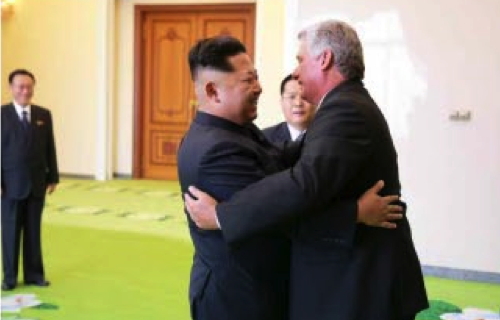In a message to Raul Castro in December 2016, North Korea ruler Kim Jong emphasized the above. Fast forward a year later, on November 20, 2017; the same day the White House announced the return of Pyongyang to the list of countries sponsoring terrorism, North Korean Foreign Minister Ri Yong Ho visited Havana.
The minister’s meetings with Raul Castro and Cuban officials lasted five days. The work visits of foreign ministers do not usually last that long. The Foreign Minister of Spain was in Cuba three days last September preparing the visit of King Felipe VI to Cuba. John Kerry’s visit in Havana lasted two days when he opened the U.S. embassy in 2015.
In the last 5 years the cooperation and collaboration between Cuba and North Korea on military, political and espionage spheres have drastically increased; reaching a level only compared to that maintained by Havana with Moscow during the Cold War.
Back in July of 2013, in Panama, an illegal shipment of Cuban weapons was discovered, hidden among sacks of sugar, in North Korean ship Chong Chon Gang. It was a clear violation of the resolutions of the UN Security Council and the Canal Neutrality Pact, which Cuba is a signatory.
That same year just one month before the arms scandal in Panama, the head of the General Staff of the North Korean army, General Kim Kyok Sik, visited Cuba, and highlighted the ties of “brotherhood” that both nations share.

Kim Jong Un embracing Miguel Díaz-Canel at the presidential palace on Sept. 7, 2015.
José Ramón Balaguer, head of the International Department of the Central Committee of Cuban Communist Party, traveled to Pyongyang at the end of July 2013, emphasizing good relations. The international uproar they had created in Panama didn’t stop the public exchanges of support between the two nations. His North Korean counterpart, Kang Sok Su, visited Cuba in June 2015 and Raul Castro met with him to “review relations”.
In March 2015, Foreign Minister Ri Su Yong visited Cuba to meet with Castro and Foreign Minister Bruno Rodríguez. The head of North Korean diplomacy arrived amid international tensions over the launching of seven missiles into the sea by Pyongyang, in a demonstration of strength in the face of joint military maneuvers by South Korea and the United States.
It is not usual that the volatile Asian ruler meets with foreign authorities and delegates. These tasks are left to other senior state officials, yet when the envoys of Havana arrive in Pyongyang the rules changed. When Cuban vice-president Miguel Diaz-Canel, visited Pyongyang in September 2015, he joined a concert with the North Korean leader. In July 2016, Kim Jong-un received the vice president of the Cuban Council of State, Salvador Valdés Mesa.
The least announced but the most important of all exchanges was the visit to Cuba on May 2016, by General Kim Yong Chol, a member of the Political Bureau of the Labor Party and head of the General Bureau of Recognition, an entity in charge of intelligence operations. He is responsible for clandestine operations, with 6 agencies that coordinate operations, recognition, technology, cybernetics, intelligence abroad, conversations between the two Koreas and service support. He supervises the famous Office 121, cyberwar agency of North Korea against the Western world. He assumed control of North Korean intelligence in January 2016, and five months later he visited Havana.
The growing Cuban-Iran-Venezuela-North Korea integration is of growing concern to U.S. policymakers. Traffic of weapons, agents, support for terrorism and increased actions against the U.S. should increase the focus of America foreign policy on this troublesome alliance.









